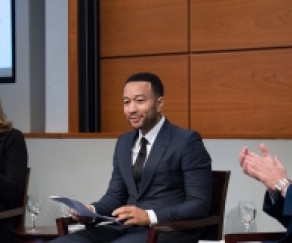John Legend C’99 moderates panel on opportunity zones and inclusive development at Penn Law
By Jenna Wang
On November 8, award-winning musician and activist John Legend moderated a panel at Penn Law, discussing the new Opportunity Zone tax incentive established by Congress in the Tax Cuts and Jobs Act of 2017. The incentive encourages investment and development in certain low-income communities, designated by state governors as “opportunity zones,” by allowing investors to defer or eliminate taxes on capital gains associated with those investments.
The event, “Opportunity Zones and Inclusive Community Development,” was held in Penn Law’s Fitts Auditorium and was hosted jointly by Penn Law’s Quattrone Center for the Fair Administration of Justice, the Penn Institute for Urban Research, and Enterprise Community Partners, Inc.
Legend, who is a member of the Quattrone Center’s Advisory Board and an alumnus of Penn’s College of Arts and Sciences, moderated the panel of distinguished speakers, which included Margaret Anadu, Managing Director at Goldman Sachs; Louis Dubin, Partner at Redbrick LMD; John Lettieri, President & CEO of the Economic Innovation Group; Terri Ludwig, CEO of Enterprise Community Partners; Michael Nutter, former Mayor of Philadelphia and current David N. Dinkins Professor of Professional Practice in Urban and Public Affairs at Columbia University; and Jim Sorenson, Chairman of the Sorenson Impact Foundation. John Hollway, Associate Dean and Executive Director of the Quattrone Center, introduced the panel.
Legend opened the panel with brief background on his upbringing in an underserved neighborhood in Springfield, Ohio, and his aspirations from childhood to not only succeed in music, but one day come back to empower his community and shed light on issues like education and criminal justice reform.
“I wanted to make black history [by becoming] a successful musician and I wanted to use my success as a musician to come back and improve my community,” Legend said. “I am pretty much living my dream right now, but I am also put in a position where I’m able to impact people’s lives who are often overlooked.”
Lettieri, responding to a question from Legend about what opportunity zone legislation means for inclusive community development, began the panel discussion by explaining that even though today’s economy is doing well, the topline national statistics do not reflect the reality that there are a record number of struggling local communities.
According to Lettieri, the top 20 percent of zip codes generated more business than the bottom 80 percent combined during the prime years of the economic recovery. As a counteraction, opportunity zones are meant to connect equity capital with the bottommost of these communities, in an attempt to bridge this economic and geographic fragmentation.
Ludwig spoke about the importance of “active listening” when engaging with people in underserved communities during the process of creating opportunity zones, and giving the power back to these people in a structured system.
“We really have to listen and learn and lift [communities] up,” she said. Ludwig also pointed to intentional, institutional racism as a factor in why certain communities are distressed, using discriminatory eviction and gentrification as examples of challenges that needed to be addressed in order to create a real choice for people to stay in their communities.
Dubin pointed out the optimistic outlook on opportunity zones due to the decline of the cost of capital in recent years, which allows many more inclusive community development projects to become viable. He said that over the course of his career in real estate development, he had never before seen “so much capital looking for a home,” but that his firm would take a cautious, due process approach to investing. Similarly, Anadu said that Goldman Sachs was adopting an optimistic but careful equity capital strategy on opportunity zones, noting that the organization invests $1 billion a year into underserved communities. Based on her experience, she emphasized the importance of thoroughly understanding communities as an outside party.
“From an inclusivity perspective, one of the things we’ve learned is [that] it’s really hard, and it takes a lot of time and real engagement with stakeholders,” she said. “[These communities] didn’t become underserved overnight, [and] we don’t think these challenges get thawed overnight.”
Sorenson, an entrepreneur and impact investor, said that opportunity zone incentives would be a “tremendous motivator” for new investors to become impact investors. However, he argued that capital alone is not a strategy, and that it must be combined with other incentives and partnerships, particularly the collaboration between state and local leaders, developers, and philanthropists.
When asked by Legend on how to balance investment with the need to avoid pushing out historical residents of underprivileged communities, Mayor Nutter stressed the importance of “intentionality” in understanding the problem before addressing solutions like encouraging the private sector to invest in affordable housing. He also pointed out the scarcity of resources when it comes to funding community projects, from a government perspective.
“On the [community development] continuum, there’s revitalization, and you get to gentrification,” Nutter said. “With intentionality, what are we trying to accomplish here? What do we do to support the folks that hung in there, that didn’t move?”
Legend ended the discussion with a call to action for the audience to put inclusivity into practice themselves, pointing out that there are many people who identify as liberal but still don’t want people from underprivileged zip-codes in their schools and neighborhoods.
“We all have a responsibility as individuals to not be a part of the problem,” Legend said. “You can’t be a ‘not in my backyard’ progressive.”
Opportunity Zones and Inclusive Community Development




